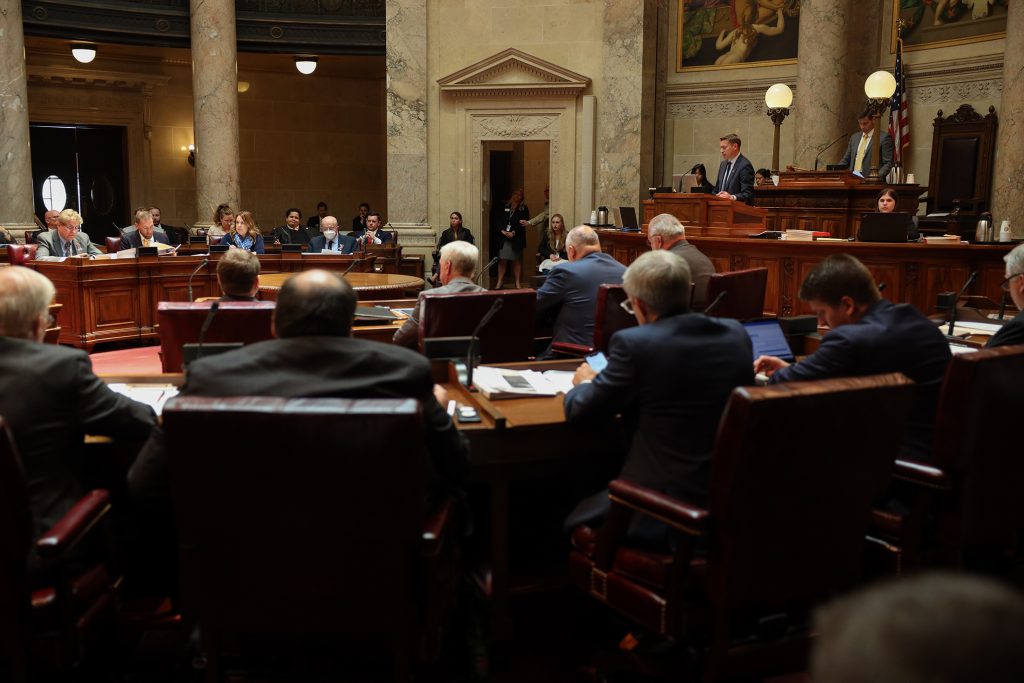Wisconsin Senate Votes 32-1 to Extend Postpartum Medicaid Coverage
But Republican Assembly Speaker Robin Vos opposes bill. Will he kill it?

The Wisconsin state Senate is photographed in session on June 7, 2023, in the Wisconsin State Capitol building in Madison, Wis. Drake White-Bergey/Wisconsin Watch
The Wisconsin Senate voted nearly unanimously Tuesday to pass a bipartisan bill to extend Medicaid coverage for new mothers, but the plan faces an uncertain future in the state Assembly.
The bill would give new, low-income mothers one year of postpartum coverage under Wisconsin’s Medicaid program. Under current law, they get 60 days of coverage. Wisconsin is one of just two states that doesn’t offer expanded postpartum coverage.
During a Tuesday floor session, Sen. Jesse James, R-Thorp, who is a co-author of the postpartum proposal, argued it isn’t expanding Medicaid, but rather “ensuring that moms who already qualify don’t lose support when they need it most.”
“Coverage can mean the difference between a mom silently struggling and getting the mental health support she truly needs,” James said. “If we can give babies a year of care, we can do the same for the mother who brought them into the world.”
The legislation passed by a vote of 32-1. Sen. Chris Kapenga, R-Delafield, was the only “no” vote. Kapenga voted in favor of the same bill last session.
Senate Minority Leader Dianne Hesselbein, D-Middleton, said she was both happy and disheartened that the chamber has to take up the bill again.
“We did this last session,” Hesselbein said. “We gave it to the Assembly, and they sat on it and did nothing. And during that time, women and babies have been hurt in the state of Wisconsin because they are not getting the care that they need.”
Hesselbein was referring to opposition to extending postpartum Medicaid benefits by Assembly Speaker Robin Vos, R-Rochester. Last year’s version of the bill never received a public hearing or a floor vote in the Assembly.
Ahead of the vote Tuesday, Vos was asked if he would prevent the legislation from getting an Assembly vote this session. “My position has been fairly clear from the very beginning,” Vos said. “I’ve never supported an expansion of welfare. I can’t imagine that I would ever support one. But we have to talk about it as a caucus.”
Senate President Mary Felzkowski, R-Tomahawk, thanked her colleagues for “saying yes” to the legislation and sounded a more optimistic note about how it will be received by the Assembly this time around.
“Sometimes it takes more than one term to get a bill done,” Felzkowski said. “Sometimes it takes two or three, sometimes it takes four. We’ll get the Assembly there.”
Push to require judges’ blessing before DAs can dismiss criminal charges passes along party lines
Another bill passed by Senate Republicans Tuesday would require prosecutors to get approval from a judge or court commissioner before they can dismiss or amend charges for crimes including domestic abuse, car theft, sexual assault, reckless driving and crimes against children. It too is a reprise of legislation from 2023, which passed the full GOP-controlled state Legislature but was vetoed by Evers.
During debate on the bill, Sen. Rob Hutton, R-Brookfield, said it reinforces the notion that people who commit serious crimes should be prosecuted instead of having their charges reduced.
He said Wisconsin’s criminal justice system “has been very lenient” on offenders who in many cases “aren’t prepared and aren’t of the mindset” to fulfill obligations of deferred prosecution agreements with district attorneys. Hutton cited data he said shows the rate of felony charges brought by the Milwaukee County District Attorney’s office fell by 18 percent between 2019 and 2022.
“I have tremendous respect for all of those who serve in our justice system,” Hutton said. “They do a difficult job on our behalf and adamantly protect our communities, but all systems need checks and balances, and this bill strives to do that.”
Sen. Dora Drake, D-Milwaukee, praised deferred prosecution agreements as a way to give offenders “a fair shot at redemption” by giving them access to things like substance abuse treatment before facing jail time.
“This is just a huge overstep at what we’re looking at within our judicial system, and it’s not our place to do so,” Drake said.
In the end, the bill passed with all Republicans in support and all Democrats opposed.
Senate uses procedural maneuver to block rules on absentee voting and possessing guns while fishing
Republicans also took a series of votes in the Senate to effectively block rules written by state agencies.
Two of them would block Wisconsin Elections Commission rules laying out requirements for filling out declarations of candidacy and nomination papers. A third would block a WEC rule to prohibit local clerks from giving absentee voting instructions that weren’t approved by the agency.
The fourth bill effectively blocked a Department of Natural Resources rule banning people from possessing firearms while fishing.
In each case, the Republican-controlled Joint Committee for Review of Administrative Rules has already temporarily suspended the agency rules. By introducing bills, then referring those bills to other committees, Republicans are able to block the rules for a longer period of time.
Sen. Chris Larson, D-Milwaukee, chided his Republican colleagues for taking that step rather than debating and voting on the issues.
“You could surprise our constituents and our shared citizens of the state of Wisconsin and do the right thing and bring these up for a vote and discuss them the way democracy is supposed to work,” Larson said.
The bills were referred to committee by voice votes.
Wisconsin Senate passes bipartisan measure to extend postpartum Medicaid coverage was originally published by Wisconsin Public Radio.
If you think stories like this are important, become a member of Urban Milwaukee and help support real, independent journalism. Plus you get some cool added benefits.





















